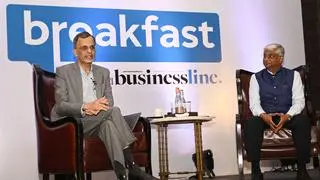The India-UK FTA negotiations are poised for an early conclusion, possibly by the year end, but India has fixed some red lines to safeguard sensitive areas such as generic medicine production, regulatory data protection, and reservation for small and medium enterprises (MSEs) in government procurement that it is unlikely to cross, sources tracking the development have said.
“The negotiating teams from India and the UK had a fruitful round earlier this month, and there is agreement on about 80 per cent of issues. “On the remaining issues, there would be more give and take, but we have redlines in Intellectual Property Rights (IPR), data protection, and government procurement that we are not going to cross,” an official source told businessline.
Also read: UK drives a hard bargain with India for free market access
In the tenth round of the India-UK FTA talks, which concluded on June 9, technical discussions were held across 10 policy areas over 50 separate sessions. They included detailed draft treaty text discussions in these policy areas. The negotiations cover 26 policy areas, which include, goods, services, investments, government procurement, sustainability, and intellectual property.
“As many as 14 chapters are substantially closed for negotiations, while there has been significant progress in other chapters,” per the Commerce Department. Both sides are hopeful that the proposed FTA will double bilateral trade to $100 billion by 2030.
Red lines
While regular meetings are being held to resolve all outstanding issues, such as tariff reduction for automobiles, wine and whisky, and visa policies, the red lines for India have been conveyed to the other side, the source said.
“India is engaged in discussions on IPR with the UK but will not give in to demands on data exclusivity and patent term extension as it would hamper production of cheap life-saving generics in the country. That cannot be compromised,” the source added.
Granting data exclusivity or exclusive rights to companies over the clinical data for their drugs will prevent other producers from launching a cheaper generic version, even if the drug does not have patent protection. Effectively, data exclusivity can be used to extend the patent life of a drug after the patent term has expired through minor modifications in the formulation and securing rights on the clinical data.
Patent term extension is about allowing a patent holder a longer term of patent protection to compensate for the time lost awaiting regulatory approvals.
Data protection
India also does not want to take on any commitments in data protection and related areas. “India has no digital policy yet and hence cannot make commitments in areas such as data localisation and data transfer. Therefore, it is important to have a carve-out for it in the proposed FTA,” the source said.
Procurement
Government procurement is yet another area where India is willing to negotiate but not ready to give up flexibilities for the MSE sector. “To encourage the lower segment of manufacturing, we have a public procurement policy that gives comfort to small and medium enterprises. We cannot compromise on that,” the source said.








Comments
Comments have to be in English, and in full sentences. They cannot be abusive or personal. Please abide by our community guidelines for posting your comments.
We have migrated to a new commenting platform. If you are already a registered user of TheHindu Businessline and logged in, you may continue to engage with our articles. If you do not have an account please register and login to post comments. Users can access their older comments by logging into their accounts on Vuukle.